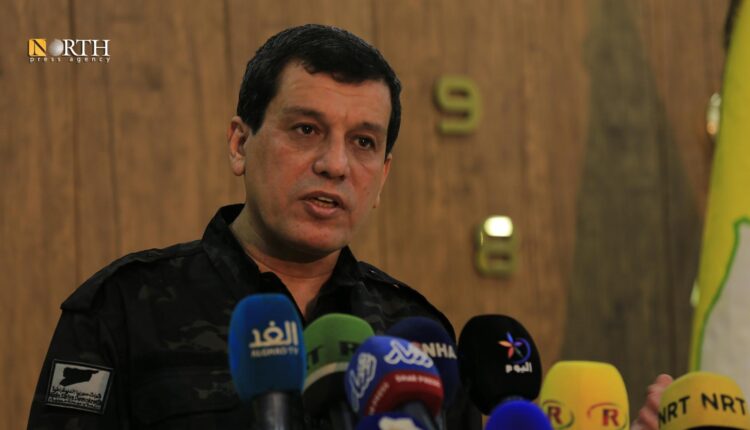SDF Commander details Tishrin Dam agreement, Syrian political talks
QAMISHLI, Syria (North Press) – The Commander in Chief of the Syrian Democratic Forces (SDF), Mazloum Abdi, commented on Saturday on the Tishrin Dam agreement reached with Turkey, clarifying elements of the broader deal signed with Syria’s transitional president, Ahmad al-Sharaa, in March.
In an interview published by the U.S.-based Monitor website, Abdi said that they have witnessed a truce that lasted more than 12 days thanks to the efforts of their partners, referring to de-escalation efforts around the Tishrin Dam.
According to Abdi, the agreement includes two main phases. The first phase, agreed upon with the transitional government, allows the dam’s current administration and technical staff to remain in the hand of the Autonomous Administration of North and East Syria (AANES), ensuring that the dam continues to operate from its existing command center until a final agreement is reached.
On the same day, a delegation from the U.S.-led Global Coalition, the transitional government, and special units from the SDF visited the dam for a joint reconnaissance tour.
The second phase of the deal includes the withdrawal of SDF units to the eastern side of the dam, transferring their former positions to forces of the Syrian transitional government.
Abdi noted that SDF forces are currently stationed eight kilometers east of the dam, and skirmishes have recently occurred in the Manbij. The presence of government forces, he said, will act as a buffer zone between the SDF and Turkish-backed armed factions, aka the Syrian National Army (SNA).
A source involved in the negotiations, speaking on condition of anonymity, told North Press that the agreement included administrative and security arrangements for the dam. Among the provisions, the dam will be neutralized as a military target, troop numbers will be gradually reduced on both sides, and Turkish-backed SNA factions are expected to withdraw from the western side, to be replaced by units from the Syrian Ministry of Defense.
The source emphasized U.S. facilitation in reaching the agreement. While the Internal Security Forces of North and East Syria (Asayish) will protect the dam, it will continue to be managed by employees from the AANES.
Abdi also elaborated that agreement with al-Sharaa dropped several preconditions previously demanded by Turkey.
Abdi added that Turkish rhetoric had become more moderate and showed a growing acceptance of the integration of both the SDF and regional administrative institutions into the Syrian state.
Regarding cultural policy, Abdi acknowledged disappointment that the Kurdish language was not included in the transitional constitution, though he confirmed that the new administration does not oppose its use.
He also outlined the SDF’s red lines, which include avoiding centralized power in Damascus and preserving the SDF’s identity within the structure of the newly forming Syrian Army.
Abdi concluded by warning against attempts by remnants of the former regime to sabotage efforts for a new democratic Syria, saying they are committed to helping the new administration resist any such disruption.

